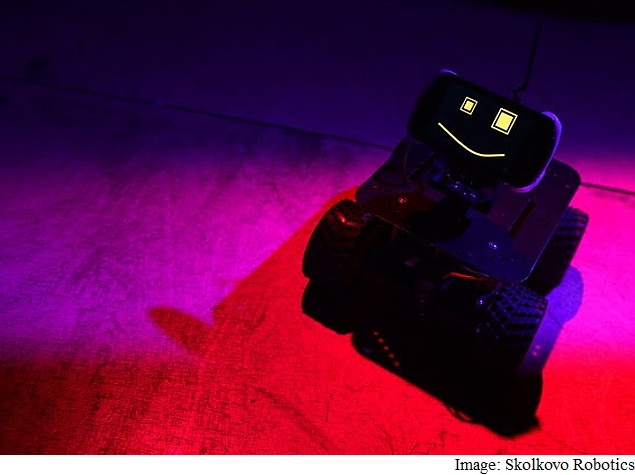- Home
- Science
- Science News
- Russia, China Sign Pact on Robotics, High Tech Innovations
Russia, China Sign Pact on Robotics, High-Tech Innovations
By Indo Asian News Service | Updated: 21 April 2015 17:10 IST

Click Here to Add Gadgets360 As A Trusted Source

Advertisement
In a significant instance of BRICS cooperation ahead of Russia assuming the group's chair in July, its Skolkovo Foundatiion and China's Cybernaut Investment Group signed an agreement on Tuesday to jointly develop, finance and market high-tech innovations.
The agreement envisages the creation of a joint Russian-Chinese business incubator, a robotics centre and a venture fund.
Cybernaut's robotics centre, which will be created in China with the help of Skolkovo's Robotics Center, will implement a joint acceleration programme for Skolkovo resident companies to ease them into the Chinese market.
Skolkovo, the strategic development institution of the Russian government, runs the Skolkovo City near Moscow which houses an innovation centre comprising over 1,000 companies and startups, a Technopark and a new university established in collaboration with the Massachusetts Institute of Technology.
The second component of the agreement is the setting up of a 1,500 square metre R&D business incubator at the Skolkovo Innovation Center for at least 15 resident companies conducting research in information technology and robotics, space, energy-efficiency technologies and new materials.
Additionally, a $200 million Russian-Chinese venture fund will invest in Skolkovo resident companies that specialize in these areas.
Thirty of the world's most successful corporations, including Boeing, Cisco Systems, Airbus (formerly EADS), GE, Johnson & Johnson and IBM have already entered into agreements with Skolkovo, which was created in 2010 as Russia's biggest innovation fund.
The Skolkovo-Cybernaut agreement will comes into force in the third quarter of 2015.
Commenting on the agreement, Russian Deputy Prime Minister Arkady Dvorkovich said: "I am certain, that by uniting efforts Russia and China can reach substantial success in the development of innovations."
"Start-up participants of Skolkovo Robotics Center interested in bringing their products to the Chinese industrial market will have a chance to go to China and to place their facilities in the robotics center," said Skolkovo Foundation vice president Igor Bogachev.
"Our collaboration in the area of robotics will be the green and high-tech origination of both countries' economic development," said Cybernaut Investment Group managing partner Du Hao.
Cybernaut is focused on a wide range of service robotics from the mining industry to educational solutions.
Over the last five years, companies in China have stepped up on robotisation in the face of labour trouble in the form of worker shortages and rising wages - and to cut production costs.
China's working-age population is slowly declining, while its National Bureau of Statistics said the country's 16-59 age group's population fell by 371,000 in 2013 to about 915 million last year.
The International Federation of Robotics has reported that China last year surpassed Japan as the world's largest market for industrial robots. Some 200,000 were operating in China at the end of 2014, with 32,000 installed in 2013 alone.
The agreement envisages the creation of a joint Russian-Chinese business incubator, a robotics centre and a venture fund.
Cybernaut's robotics centre, which will be created in China with the help of Skolkovo's Robotics Center, will implement a joint acceleration programme for Skolkovo resident companies to ease them into the Chinese market.
Skolkovo, the strategic development institution of the Russian government, runs the Skolkovo City near Moscow which houses an innovation centre comprising over 1,000 companies and startups, a Technopark and a new university established in collaboration with the Massachusetts Institute of Technology.
The second component of the agreement is the setting up of a 1,500 square metre R&D business incubator at the Skolkovo Innovation Center for at least 15 resident companies conducting research in information technology and robotics, space, energy-efficiency technologies and new materials.
Additionally, a $200 million Russian-Chinese venture fund will invest in Skolkovo resident companies that specialize in these areas.
Thirty of the world's most successful corporations, including Boeing, Cisco Systems, Airbus (formerly EADS), GE, Johnson & Johnson and IBM have already entered into agreements with Skolkovo, which was created in 2010 as Russia's biggest innovation fund.
The Skolkovo-Cybernaut agreement will comes into force in the third quarter of 2015.
Commenting on the agreement, Russian Deputy Prime Minister Arkady Dvorkovich said: "I am certain, that by uniting efforts Russia and China can reach substantial success in the development of innovations."
"Start-up participants of Skolkovo Robotics Center interested in bringing their products to the Chinese industrial market will have a chance to go to China and to place their facilities in the robotics center," said Skolkovo Foundation vice president Igor Bogachev.
"Our collaboration in the area of robotics will be the green and high-tech origination of both countries' economic development," said Cybernaut Investment Group managing partner Du Hao.
Cybernaut is focused on a wide range of service robotics from the mining industry to educational solutions.
Over the last five years, companies in China have stepped up on robotisation in the face of labour trouble in the form of worker shortages and rising wages - and to cut production costs.
China's working-age population is slowly declining, while its National Bureau of Statistics said the country's 16-59 age group's population fell by 371,000 in 2013 to about 915 million last year.
The International Federation of Robotics has reported that China last year surpassed Japan as the world's largest market for industrial robots. Some 200,000 were operating in China at the end of 2014, with 32,000 installed in 2013 alone.
Comments
Catch the latest from the Consumer Electronics Show on Gadgets 360, at our CES 2026 hub.
Related Stories
Popular on Gadgets
- Samsung Galaxy Unpacked 2025
- ChatGPT
- Redmi Note 14 Pro+
- iPhone 16
- Apple Vision Pro
- Oneplus 12
- OnePlus Nord CE 3 Lite 5G
- iPhone 13
- Xiaomi 14 Pro
- Oppo Find N3
- Tecno Spark Go (2023)
- Realme V30
- Best Phones Under 25000
- Samsung Galaxy S24 Series
- Cryptocurrency
- iQoo 12
- Samsung Galaxy S24 Ultra
- Giottus
- Samsung Galaxy Z Flip 5
- Apple 'Scary Fast'
- Housefull 5
- GoPro Hero 12 Black Review
- Invincible Season 2
- JioGlass
- HD Ready TV
- Laptop Under 50000
- Smartwatch Under 10000
- Latest Mobile Phones
- Compare Phones
Latest Gadgets
- Tecno Spark Go 3
- iQOO Z11 Turbo
- OPPO A6c
- Samsung Galaxy A07 5G
- Vivo Y500i
- OnePlus Turbo 6V
- OnePlus Turbo 6
- Itel Zeno 20 Max
- Lenovo Yoga Slim 7x (2025)
- Lenovo Yoga Slim 7a
- Lenovo Idea Tab Plus
- Realme Pad 3
- Garmin Quatix 8 Pro
- NoiseFit Pro 6R
- Haier H5E Series
- Acerpure Nitro Z Series 100-inch QLED TV
- Asus ROG Ally
- Nintendo Switch Lite
- Haier 1.6 Ton 5 Star Inverter Split AC (HSU19G-MZAID5BN-INV)
- Haier 1.6 Ton 5 Star Inverter Split AC (HSU19G-MZAIM5BN-INV)
© Copyright Red Pixels Ventures Limited 2026. All rights reserved.
















